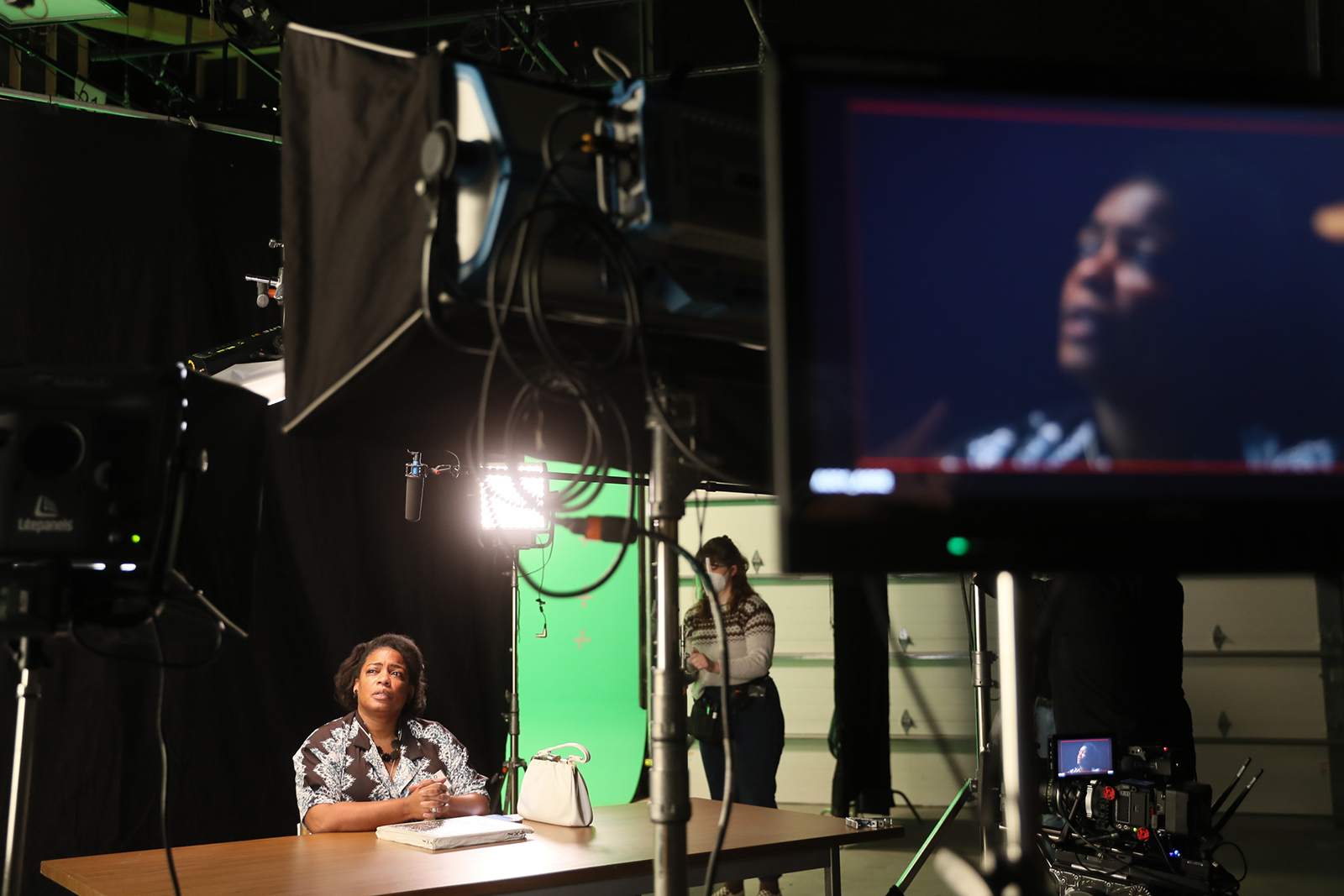 Oscar-nominated actress Aunjanue Ellis plays civil rights icon Fannie Lou Hamer in a new short film produced by at DePaul Cinespace Studios. (Image by Rhonda Nunn)
Oscar-nominated actress Aunjanue Ellis plays civil rights icon Fannie Lou Hamer in a new short film produced by at DePaul Cinespace Studios. (Image by Rhonda Nunn)
A DePaul crew of students, staff and alumni powered the creation of a new short film about civil rights icon Fannie Lou Hamer. “FANNIE” stars Oscar-nominated actress Aunjanue Ellis and was filmed at DePaul Cinespace Studios over one October weekend in 2021. Filmmaker Christine Swanson knew DePaul’s reputation for collaboration from her time directing “Chicago P.D.” at Cinespace Chicago Film Studios. When she approached DePaul’s John Corba, the project came together quickly.
“Next thing I knew, I had a place to shoot it, a cinematographer, equipment,” Swanson says. In all, 10 students, alumni and staff worked alongside industry professionals, in roles from production to lighting.
The film focuses on Hamer’s testimony in front of the Democratic National Convention Credentials Committee on Aug. 22, 1964. With gripping emotion, Ellis portrays Hamer sharing personal experiences of voter suppression and being jailed and beaten after attending a voter registration workshop in Mississippi. Hamer sought to break down segregation and exclusion in her party and asked to be recognized by the official delegation.
Corba, director of DePaul Cinespace Studios, served as a producer for the film. “What an amazing idea this film was, and what an important point in history,” he says. “It was an honor to watch it go from the page to the stage. The film speaks to both DePaul’s Vincentian mission and DePaul Cinespace Studios’ role in bringing our students meaningful, professional experiences.”
Ellis has been nominated for Golden Globe and Emmy Awards and, most recently,
earned an Academy Award nomination for best supporting actress in “King Richard.” She wrote a full-length feature film about Hamer’s life and approached Swanson about creating a “proof of concept.” To launch the short, Swanson won $10,000 from the Ida B. Wells Disrupt the Master Narrative Fund, an award that invests in filmmakers whose work embodies a spirit of exploration and deep inquiry.
“It’s quite astonishing that Fannie Lou Hamer has been relegated to the back seat of the civil rights story in many ways,” Swanson says. “Her story is interestingly relevant now more than ever. We have not effectively dealt with the issues that Fannie Lou Hamer brought up. Black and brown people are still fighting for political representation.”
Swanson led a screenwriting workshop in the past with DePaul students and knew they would “bring their A-game,” but says she was moved by the experience as both a filmmaker and a teacher. “What I didn’t anticipate was the immersive experience the students had with the material.”
Fourth-year student Emily Holland served as a production assistant, organizing and preparing supplies and “being a helping hand” around the set. “Watching Christine work and seeing how she communicates with the actress to bring her vision alive was really fascinating to watch,” Holland says. “It was inspiring to watch Aunjanue Ellis' personal process for transforming into Fannie Lou Hamer.”
Third-year student Aylene Lopez served as best boy electric, assisting the gaffer and operating flashing lights that mimicked camera flashes. “To think that Fannie Lou Hamer delivered this speech in front of so many people is mind-blowing. I was very impressed and thankful to be in this role,” Lopez says. The experience has shifted her interests to lighting, in addition to her focus on studying cinematography.
While students have been back on set at DePaul Cinespace Studios, this level of collaboration with professional filmmakers is ramping up again with COVID protocols in place. “It takes planning, but it can be done,” Corba says.
Swanson, who teaches screenwriting at the University of Georgia, is proud of the film and DePaul students’ interest in Hamer’s story.
“Every teacher dreams that something we do actually connects with students in a visceral and palpable way. The DePaul students’ response to this work lets me know this is not a Black story. This is a human story. This is an American story,” Swanson says. “The fact that everyone on the crew felt different leaving the set from the time when they came in — it is just sublime.”
The film “FANNIE” is
available online.
Please note: The film addresses physical and sexual violence and contains a racial slur that may be triggering. The content of the film is a historical rendering taken directly from Fannie Lou Hamer’s life and testimony. To learn more about Hamer’s life and the Mississippi Freedom Democratic Party, visit the
National Women’s History Museum website.
Watch behind-the-scenes footage of the filming below with images and video by Rhonda Nunn.